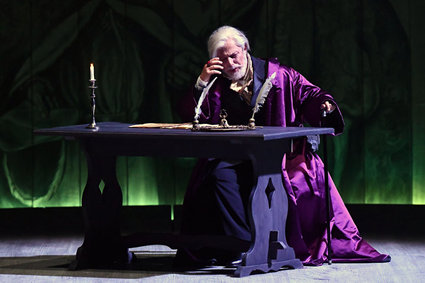| Opera Reviews | 3 May 2024 |
I due Foscari opens the 2019 Festival Verdiby Silvia Luraghi |
|
| Verdi: I due Foscari Festival Verdi 26 September 2019 |
|

Vladimir Stoyanov (Francesco Foscari)
|
|
|
The 2019 edition of the Festival Verdi opened at Parma’s Teatro Regio on September 26th with a new production of Giuseppe Verdi’s I due Foscari, co-produced with Bologna’s Teatro Comunale. The production, directed by Leo Muscato, featured sets by Andrea Belli, who staged the action on a round platform, that could be adapted to show the council room, the Doge’s apartment, the prison in which his son Jacopo waits for the verdict of the council to be enforced. A few details were added to hint at the different settings: portraits of the past governors of Venice, chains dropping from above to build a secluded space and, in the end, an opening at the back, and a steep aisle that led Jacopo into exile. The lights by Alessandro Verazzi also played a major role in depicting the various settings. The costumes, designed by Silvia Aymonino, were likewise essential: the council members wore black coats, and only a velvet mantel and the typical hat identified the Doge as such. The stage director said in an interview that he had decided to move the time of the action to the Romantic era, as an homage to Byron, on whose work the opera is based. Among Verdi’s early operas, I due Foscari is characterized by being set almost exclusively in interiors (with the marginal exception of a Venetian gondolieri’s song in the third act). While the title highlights the relation between father and son, Lucrezia also plays an important role in the confrontation with her husband Jacopo and especially with her father in law Francesco, in line with similar confrontations between other fathers with their daughters or with their sons’ partners in several of Verdi’s operas. The frequent arias and duets call for voices that can delve into the complex temperaments of each character. Unfortunately this requirement was not always met in this production. On stage, the cast was dominated by baritone Vladimir Stoyanov, who portrayed Doge Francesco Foscari as a troubled and weak old man, overcome by sorrow and acting as a puppet in the hands of the council members. As his unhappy son Jacopo, tenor Stefan Pop displayed a nicely colored, ringing voice, but the score was seemed too demanding for him, and he occasionally had to force (this was especially true of the opening aria). Soprano Maria Katzarava found herself at odds with the top notes, went out of tune a couple of times, and failed to convince in the complex role of Lucrezia Contarini especially on account of rather poor diction. Bass Giacomo Prestia was a compelling Loredano, looking adequately wicked especially in the final act. The Filarmonica Arturo Toscanini played together with the Orchestra Giovanile della Via Emilia under the skillful lead of Paolo Arrivabeni, while the chorus, instructed by Martino Faggiani, gave a very important contribution to the success of the evening. In the end, the audience paid a tribute of ten minutes applause to all the artists, with a triumph for Stoyanov.
|
|
| Text ©
Silvia Luraghi Photo © Roberto Ricci / Teatro Regio di Parma |
|







